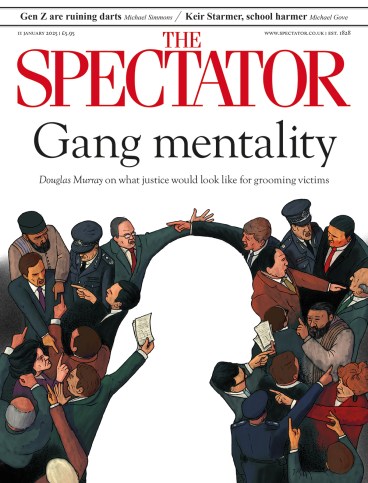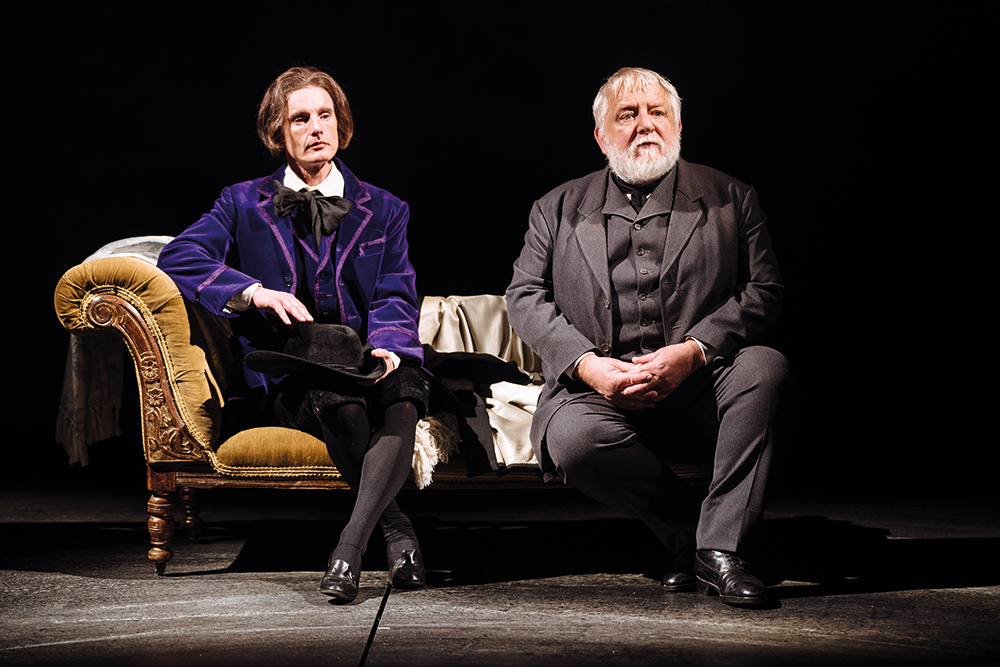
The Invention of Love opens with death. Tom Stoppard’s play about A.E. Housman starts on the banks of the Styx, where the recently deceased poet is waiting for Charon, the boatman, to ferry him across the water. Charon has been told to pick up ‘a scholar and a poet’ and he’s expecting two souls, not one. Houseman explains that he pursued both careers and is therefore a solo passenger.
The play’s storyline emerges slowly and with immaculate taste. Stoppard is not one for cheap tricks
This takes place in 1936, the year of Housman’s death, and we then flip back to Oxford in the 1870s. The river Styx becomes the Cherwell, where Housman and two chums are paddling upstream while discussing a flamboyant young intellectual, Oscar Wilde. This visually challenging scene involves three men rowing in separate boats that somehow merge into a single vessel. The solution is technically brilliant, artistically pointless and oddly satisfying.
We cut to Housman’s rooms at St John’s College where he immerses himself in the Latin love poets, Catullus and Horace mainly, with a few asides about Virgil, Propertius and Tibullus. Much of the dialogue focuses on the corrupt medieval texts that bear the foolish emendations of ill-taught scholars. Stoppard doesn’t spare us the details. If you’re aware that ‘bella’, the plural of ‘war’ in Latin, is also the feminine singular of ‘bellus’ meaning ‘pretty’, you’ll understand one of the easier passages of critical exegesis in this play. A bit of advance homework may be helpful. Look up ‘trochus’, the Latinised form of the Greek for ‘hoop’, and you’ll discover that it was a gift commonly presented by an older man to his younger playmate. But why would a Roman poet like Horace call it a ‘Greek hoop’ when his readers knew its etymology already? Such puzzles are addressed in speeches that may leave some viewers feeling excluded.
Fear not. Let it flow over you. Stoppard enlivens the academic debates with the best-known quotes by Walter Pater and John Ruskin. Pater likens intellectual curiosity to a physical passion. ‘Burn always with this hard gem-like flame,’ he advises. Ruskin laments the sacrifice of Derbyshire’s countryside to railway speculators who facilitate the mania for shopping. ‘Every fool in Buxton can be in Bakewell in half an hour, and every fool in Bakewell at Buxton.’ The dons exchange these borrowed snippets while indulging in fruitless games of snooker or croquet. It’s not a bad caricature of an Oxford classics faculty.
The play’s storyline emerges slowly and with immaculate taste. Stoppard is not one for cheap tricks. Housman and his roommate, Jackson, discover that the Roman poets were omnisexual and wrote openly about affairs between grown men. At the same time, Housman develops a crush on Jackson which is unrequited and, of course, unmentionable. Years later, he considers telling his pal the truth but he fears the ruin of their friendship. Nevertheless, he declares his love. And their friendship is not ruined. That’s the story. What a fabulous romantic tale it is. Friendship conquering erotic sentiment and prejudice as well.
Some of Housman’s more liberated colleagues are exploring their sexual nature, which lacks an English label. By joining the Greek for ‘same’ and the Latin for ‘sex’ you have ‘homosexual’. This deformity appals the purists. ‘It’s half Greek, half Latin,’ says one. ‘That’s about right,’ says another. Housman, the ultimate closeted gay, is confronted by Oscar Wilde (the wonderful Dickie Beau) who accuses him of failing in his duty as an artist to start a revolution and to reshape society in his own image. Housman sheepishly admits that, rather than throwing himself into a war against Victorian morality, he ‘stayed at home’.
It may be the most exquisitely funny and satisfying drama presented on the London stage in the past 20 years
Stoppard can’t resist the temptation to satirise Wilde’s rhetoric. He reimagines Wilde as a sugar addict who confesses that a recent binge began when he ‘ate a social éclair’ out of respect for his host. Then, after gorging himself for hours, Wilde blacked out completely ‘and I woke up in a welter of patisseries.’ Stoppard aims high in this play. And he scores. It may be the most exquisitely funny and satisfying drama presented on the London stage in the past 20 years.
Simon Russell Beale was born to play Housman. Lonely, passionate, hesitant, curious, secretive, remorseful, frustrated – he gets it all. Sometimes he gets it all with the tiniest gesture of hand or eye. Here it is. The full Housman.
Hold On To Your Butts is a satirical tribute to Jurassic Park. The three performers create a new version of the film that centres around the soundtrack. And they use household junk to imitate every character, dinosaur and vehicle. You’ll need a frame-by-frame knowledge of the movie to get all the jokes.
Slightly confusingly, the show uses two soundtracks running in parallel. One is pre-recorded and the other is being laid down during the performance. Sound technicians will love this experimental spoof. The crowd, who seemed to be dinosaur nuts, roared at every gag.






Comments